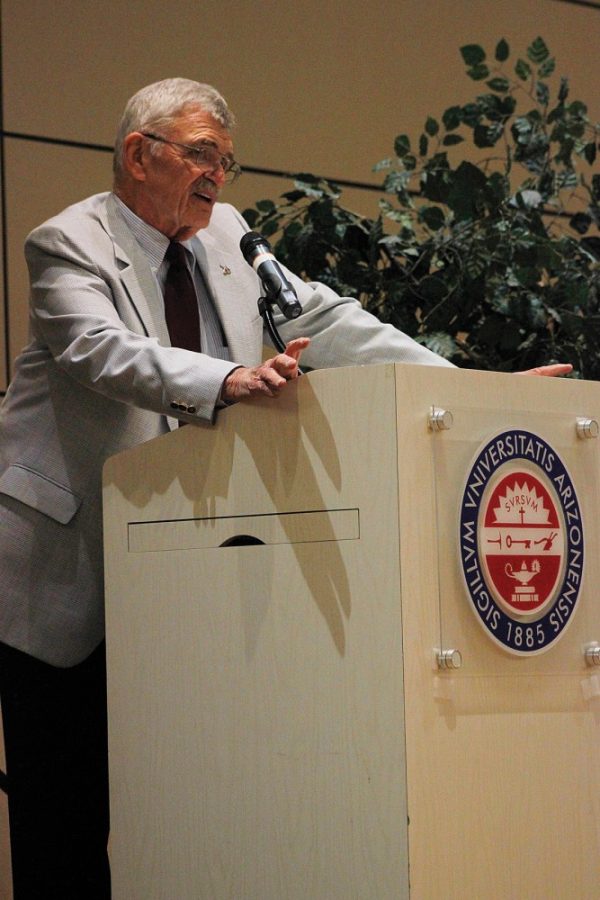UA President Eugene Sander and other appointed UA professionals had a question and answer session on Tuesday in the Student Union Memorial Center Grand Ballroom.
The 3,600 appointed professionals are not university faculty or staff, but they are chosen administrators, teachers and researchers, according to Ronald Wysocki, chair of the Appointed Professionals Advisory Council.
Greg Hodgins, an assistant researcher in physics and former science representative on the Appointed Professionals Advisory Council, moderated the question and answer session and asked a variety of questions on behalf of appointed professionals.
Hodgins: I noticed you (Sander) are not on the Arizona Board of Regents Presidential Search Committee. What is your role in the search for our new president?
Sander: I’m really interested in the search. The reason I’m sitting here as president today is because the UA found itself in a clumsy position when Shelton decided to retire rather early. I said “Fine,” because as a previous long-term dean, I agreed to step in and create an environment where a new president could hardly wait to get here. A person should never be in a position where they greatly influence their successor. If you do, you get the same old, same old. I’m trying to stay hands off in terms of the search, but with that said, your next president needs to be an absolutely splendid leader. He or she doesn’t have to be a poet or a scientist, but someone who can deal with state legislators, donors, college deans and appointed professionals. You need a people person. Their potential capability to deal with external factors is terribly, terribly important.
From a UA perspective, I’m feeling that we exist in competition between our fellow Arizona sister schools in policy and funding. Are there things you can help us do to redirect our efforts toward the UA’s mission?
The UA is a large land-grant Research I institution. Our mission is multifold: To provide an educational opportunity for graduate and undergraduate students, that our outreach is funded and paid for and that we generate big chunks of research money very, very well. It’s a comparative issue, because there are differences between ASU (Arizona State University) and the UA. What they do is somewhat different then what we do, and it doesn’t mean their quality is higher or lower then ours — it’s just different. Our differences should be celebrated. If we took as many students as ASU did in the past few years, appointed professionals wouldn’t be here. It’s important for this school to reach out and touch our friends up at ASU and say, “let’s celebrate these differences and quit shooting one another.” We should have competition outside of this state instead of inside of the state. We are tired of competing with each other for in state, merit based scholarships. Let’s set the price, and let the students decide where they want to be based on the merit of our programs. ASU also did a great job with their technology transfer, and if we can collaborate with them on that, it could really save us money.
I noticed that appointed professionals don’t have performance evaluations. Do you have ideas as to how appointed professionals should be graded?
Appointed professionals should have performance evaluations. If you don’t, there is no basis for a rewards system. The old argument is that appointed professionals aren’t getting raises anymore, so why should they have evaluations? That is a pretty lame excuse. I will try to put a little bit of muscle in the process, because I believe it is really important.
I believe tenure is a very important foundation of a healthy university society. Appointed professionals don’t have access to tenure, but we do jobs that were previously held by tenure faculty. Do you see this trend continuing? Do you think it raises issues of pay, fairness and job security?
I do see a change in the use of appointed professionals, especially in the teaching areas. It makes me sick to hear that appointed professionals believe their inability to receive tenure affects their job security. As we face difficult times, we need to find a way to change. With more individuals focused on teaching and with individuals who want to follow a different career path then just research, we must build some security into the system to attract people to certain positions. If we want good people to work at the UA, we must offer some type of security for those doing a good job.









